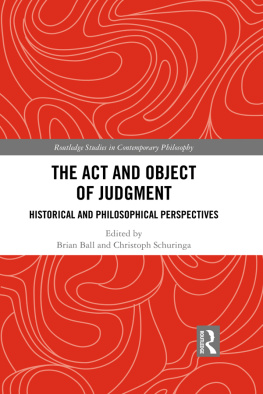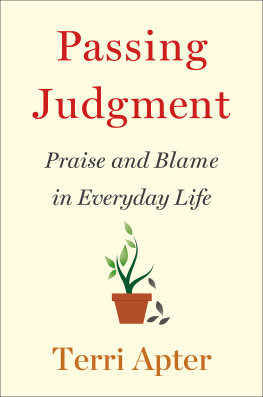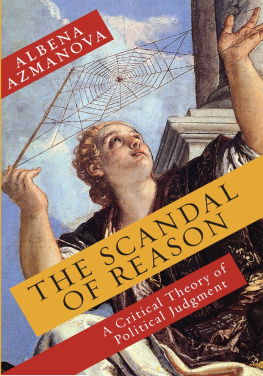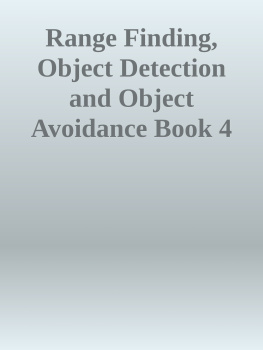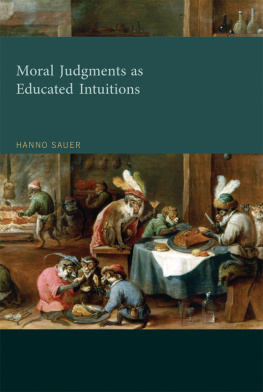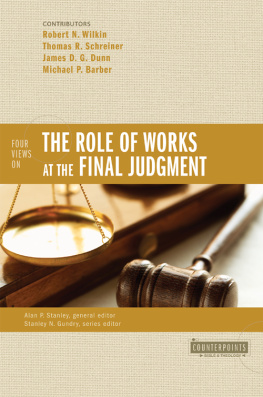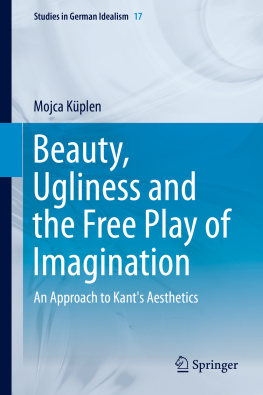1
Affirmation, Judgment, and Epistemic Theodicy in Descartes and Spinoza
Martin Lin
Both Descartes and Spinoza develop their theories of judgment in the service of what may be called epistemic theodicy, in that they seek to reconcile human error with the existence of a perfect God. They have, however, very different conceptions of God and the relationship of the human mind to that God and, therefore, develop very different conceptions of judgment.
Descartess God is a transcendent being in whose image the human mind has been made and whose commandments we seek to fulfil. Human error is compatible with the existence of a perfect God because we are free to use our cognitive capacities well or poorly. In particular, judgment (affirming, denying, or suspending judgment with respect to the content of an idea) is a matter of a free act of will. God has given us a faculty that allows us to discover a rule for applying our free will in judgment so that we will never affirm a false proposition and that allows us to unerringly affirm certain truths. And, thus, when we err, the responsibility for error falls to us and not God.
For Spinoza, unlike Descartes, God is not a transcendent being; rather, he is the one substance in which all else, the human mind included, inheres. Indeed, for Spinoza, the human mind is an idea in Gods infinite intellect and constitutes Gods knowledge of the human body. This entails that every idea in the human mind is identical to an idea in God. Since all ideas, insofar as they are in God, are true and, indeed, known, all ideas, in and of themselves, are affirmed. This thesis has at least two troubling consequences. First, it seems difficult to reconcile with the apparent existence of cognitive attitudes such as denial and suspending judgment. Second, it appears to entail that all ideas are believed.
In this paper, I begin by setting out Descartess account of judgment and how it accomplishes an epistemic theodicy. I then discuss Spinozas official argument for the claim that every idea is affirmed and note certain difficulties with it that prompt recent interpretations according to which Spinozas notion of affirmation is reducible to his notion of conatus or striving for self-preservation. I argue that such interpretations must be rejected on the grounds that they fail to preserve the connection between affirmation and truth that Spinoza endorses. I suggest instead that, for Spinoza, every idea is affirmed in the sense that every idea purports to represent the world as it really is. Striving for self-preservation does not ground this affirmation, but it looks to it for guidance so that each idea pushes us to act in ways that would be conducive to our self-preservation if it were true. When different ideas push us in different directions, how we act is a function of the respective degrees of power associated with each idea, considered as an individual in its own right. I conclude by arguing that Spinozas notion of affirmation should be regarded as a technical one that is unconnected with the ordinary conception of belief, which, I argue, plays no role in Spinozas psychology.
1. Descartess Theory
In the Third Meditation, Descartes proposes the following rule: whatever I clearly and distinctly perceive is true. Proving the existence of such a God is the principal task of the Third Meditation.
At the start of the Fourth Meditation, Descartes confronts the worry that he has proved too much. If the existence of a non-deceiving God gives us a reason to trust our clear and distinct perception, wouldnt it also give us a reason to trust all of our perceptions? After all, if God is no deceiver, wouldnt he design us in such a way that our cognitive capacities never deceived us? This question is especially troublesome to Descartes because he thinks that our sensory perception of the world provides us with ample opportunities to err: it presents the world to us as having qualities that it does not, in fact, have. It presents, for example, an apple to me as red, fragrant, and sweet when in fact it is none of those things. (At least it is none of those things in the way they are presented to me in sense perception, that is, as intrinsic properties of the apple distinct from its geometrical ones.) Rather, the only properties that the apple truly has are modes of extension: size, shape, and motion. Why then did God, who is no deceiver, design me in such a way that my sensory capacities consistently give misleading testimony?
This is where his theory of judgment comes in, which is, as we will see, designed to show that we, and not God, are responsible for our errors. For Descartes, the mind is composed of two faculties or powers: intellect and volition.denying, wanting, and fearing are all volitions that a mind possesses in virtue of the will.
Merely having an idea, all by itself, cannot constitute an error, even if that idea represents what is not the case. Only if we affirm an idea that represents what is not the case or deny an idea of what is the case do we err. When we affirm or deny an idea, we make a judgment. Judgment, thus, for Descartes, involves the cooperation of two distinct mental faculties: intellect and volition.
It is useful to contrast Descartes on this score with some of his scholastic predecessors, such as Aquinas, who thought that (apart from the special case of religious faith) judgment was an act of the intellect alone. According to this scholastic tradition, the first operation of the intellect involves cognizing accidental and substantial form. For example, the first operation of the intellect may abstract from sense perception of a red apple a representation of the accidental form of red and a representation of the substantial form of an apple. A judgment results when I combine my representation of redness with my representation of an apple into the form the apple is red .
There are at least two ways in which Aquinas and Descartes differ on the issue of judgment. The first difference concerns the nature of the object that receives the action. In the case of Aquinas, the objects of the action are the mental representations of the forms. They are joined together in such a way that one is predicated of the other. For Descartes, on the other hand, the object of the action is an idea, the content of which already has propositional structure. For example, in the case of thinking about a red apple, judgment for Aquinas is the process by which the concept red is combined with the concept apple . We judge of the apple that it is red.
An interesting result of this difference is that Descartess theory of judgment allows for attitude to vary independently of content, whereas Aquinass does not. For example, take the idea that the apple is red. We could affirm or deny that very idea, on Descartess view, merely by changing the quality of our will with respect to it. But, for Aquinas, the actions of combining and separating are not directed at the bearers of propositions but at sub-propositional elements, and thus separating cannot be like judging a proposition to be false. What is more, separating cannot merely be refusing to combine. Not predicating redness of an apple is not the same as judging the proposition that the apple is red is false. A natural solution to this difficulty for Aquinas would be to hold that separating is somehow like negation. For example, it would result in a judgment that it is not the case that the apple is red. The content of this judgment is, however, different from the content of the judgment that the apple is red. Thus, for Aquinas, unlike Descartes, attitude and content cannot vary independently.
The second point of contrast is that judgment for Aquinas is an operation of the intellect alone, whereas, for Descartes, judgment requires the cooperation of the will, the same faculty that is responsible for purely conative attitudes such as wanting and fearing. This is a curious feature of Descartess account. Why think that the attitudes involved in wanting that p and affirming that p are the products of the same faculty?

